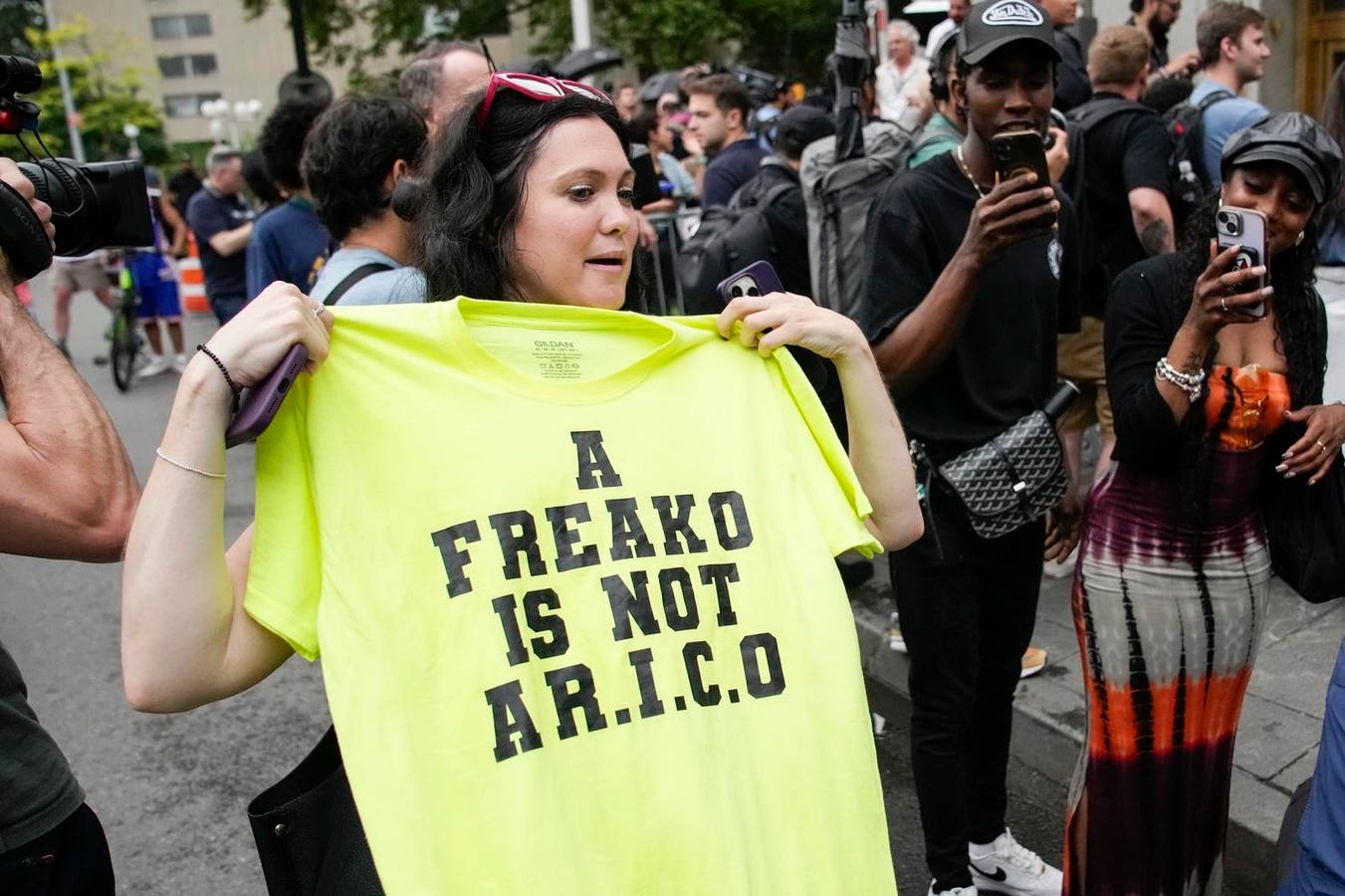NEW YORK, NEW YORK – JULY 2: People react outside federal court as verdicts are announced during … More
After 28 days of testimony, 2 days of closing arguments and 12 hours of jury deliberation, Sean Diddy Combs was found guilty of one count of transporting individuals including but not limited to his former girlfriend Casandra Ventura to engage in prostitution and one count of transporting individuals including but not limited to another former girlfriend who testified under the pseudonym “Jane.” Each of those charges carry a maximum 10-year prison sentence. However, he was found not guilty of the three most serious charges, namely sex-trafficking by force, fraud or coercion of Casandra Ventura; sex-trafficking by force, fraud or coercion of “Jane” and the RICO racketeering conspiracy charge which was the bulwark of the entire case. Had he been found guilty of the RICO charge he faced a potential life sentence in prison.
The two charges of which he was convicted applied to flying people including Cassandra Ventura and “Jane” along with paid male sex workers around the country to engage in extreme sexual encounters referred to in court as “freak-offs.”
In regard to the sex trafficking by force, fraud or coercion charges, the jury may have considered that Cassie Ventura had been in an 11 year relationship with Combs during the time of the freak-offs and “Jane” had been in a 3 year relationship with Combs while participating in the freak offs. Being in such long-standing relationships could have been considered by the jury to be an indication of consent. Additionally, numerous text messages from both women were entered into evidence indicating enthusiasm for participating in the freak-offs including one from Ventura that read “Baby. I want to FO sooooo bad.” FO being the abbreviation for freak-off.
But what is the RICO law and how has it evolved?
The Racketeer Influenced and Corrupt Organizations Act (RICO) is Title IX of the Organized Crime Control Act of 1970 and was enacted as a tool to fight organized crime.
RICO lists four types of prohibited conduct:
- Using income from a pattern of racketeering activity to get an interest in an enterprise engaged in or the activities of which affect interstate commerce.
- Acquiring or maintaining through a pattern of racketeering activity an interest in an enterprise, engage in or the activities of which affect interstate commerce.
- Conducting or participating in the conduct through a pattern of racketeering activity of such affairs of an enterprise affecting interstate commerce.
- Conspiring to further any of these activities.
An enterprise is defined as “any individual, partnership, corporation, association or other legal entity and any union or group of people associated in fact although not a legal entity.”
The original intention of the law was to target organized crime, such as the Mafia, enabling prosecutors to target the leaders of these groups even if they were not personally present when the crimes were committed. Prior to RICO, while law enforcement may have been able to convict lower-level members of organized crime groups they had difficulty getting convictions against the leaders of such groups. Under RICO, it was no longer necessary to prove that someone personally committed a particular crime, but rather merely that the defendant controlled or managed an enterprise that committed specific crimes referred to as predicate acts. A pattern of racketeering activity requires at least two acts within ten years. In Combs’ case, the prosecution alleged kidnapping, arson, forced labor, bribery and sex trafficking as the predicate acts constituting racketeering activity.
The first Mafia crime boss to be convicted under RICO was Genovese crime family leader Frank Tieri in 1980.
However, over time the law’s use has been expanded to include convictions of:
- Gil Dozier, Louisiana Commissioner of Agriculture and Forestry on RICO charges related to extortion in 1980;
- Members of the Key West Police Department on RICO charges related to operating a protection racket for cocaine smugglers in 1984;
- Florida attorney Scott Rothstein on RICO charges related to running a $1.2 billion Ponzi scheme in 2010;
- John Kapoor founder and chairman of the Board of Insys Pharmaceuticals for RICO charges related to the marketing of its opioid Subsys in 2020;
- Jack Owuor on RICO charges related to operating a widespread grandparent phone scam ring in 2022.
RICO charges similar to those brought against Combs had been previously brought against R&B singer R. Kelly who was convicted in 2021 of RICO racketeering and sex trafficking charges leading some people to believe that Combs would also have been convicted of violating RICO. In fact, the day before issuing its verdict, the jury indicated to the judge that it was deadlocked on this critical charge while agreeing on the other four counts.
The significant difference between the cases against Kelly and Combs however was that Kelly was convicted of recruiting underage girls for sexual exploitation who were legally incapable of giving consent, making the case against Kelly much easier to prove.




